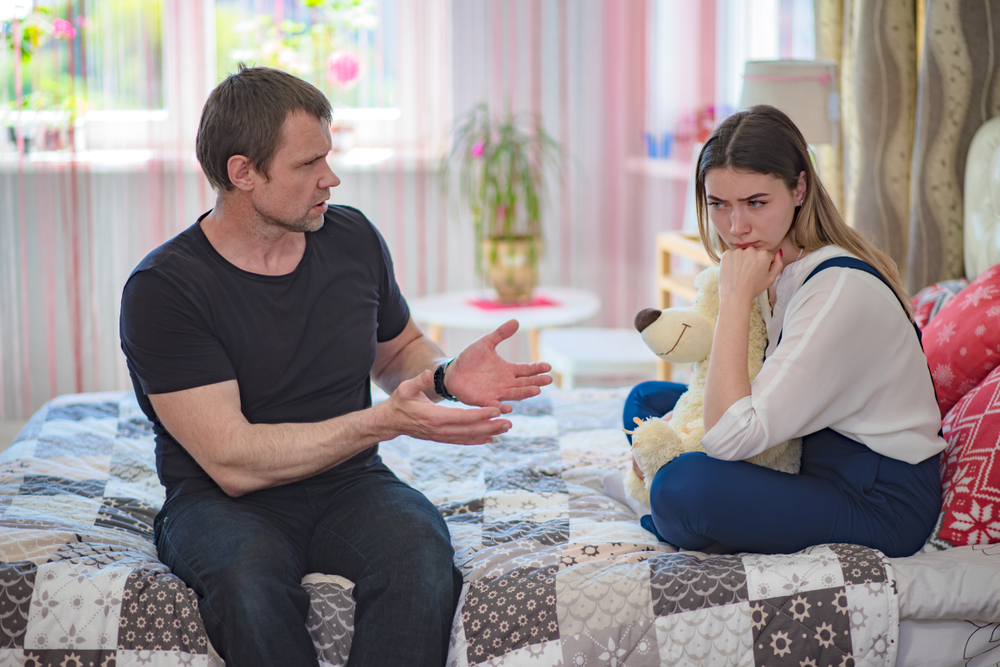Raising Children is one of the most important responsibilities a person can take on. But even with the best intentions, many parents fall into patterns that hurt rather than help their Children. Some mistakes are obvious, while others are subtle and build over time. This article explores the 20 biggest ways parents fail their Children and how those failures can impact emotional, social, and psychological development. While perfection is impossible, awareness can lead to better parenting choices and stronger relationships.
Ignoring Emotional Needs

Parents often focus on providing for a child’s physical well-being-things like food, clothing, shelter, and education. But when emotional needs are ignored, it sends a silent message that feelings do not matter. A child who is never asked how they feel after a bad day or who is told to “toughen up” may learn to suppress their emotions entirely. Over time, this creates adults who struggle to connect, express vulnerability, or trust others. Emotional neglect can result in poor emotional regulation, high stress levels, and difficulty in forming healthy relationships. Children need to know their inner world matters just as much as their outer achievements. Regularly checking in with a child emotionally, even in small ways, can help them feel secure and understood.
Overusing Punishment

It is common for parents to believe that punishment is the only way to teach right from wrong. But repeated scolding, spanking, or grounding without explanation can do more harm than good. Children subjected to constant punishment may grow resentful or fearful, especially if they do not understand what they did wrong. This leads to sneaky behavior rather than true understanding. Punishment without guidance teaches compliance but not critical thinking or empathy. Effective discipline is rooted in communication and consistency. When parents explain why a behavior is harmful and offer ways to do better, children are more likely to grow into thoughtful, responsible adults rather than ones who act out when unsupervised.
Comparing Siblings

Some parents fall into the trap of saying things like “Why can’t you be more like your sister?” or “Your brother never caused this much trouble.” These comparisons are rarely helpful and often damaging. They create rivalry and competition, forcing children to fight for approval instead of growing together as a family. The child being favored may develop a superiority complex, while the other may struggle with worthlessness. This dynamic often follows them into adulthood, showing up in issues with self-esteem or sibling resentment. Parents should strive to see each child as an individual, with their own pace, personality, and strengths. Celebrating each child’s unique qualities fosters emotional security and healthier family dynamics.
Modeling Poor Communication

The way parents handle conflict sets the tone for the household. If children witness yelling, blame, sarcasm, or the silent treatment, they absorb those behaviors as normal. They may replicate these patterns in school, friendships, or future romantic relationships. On the other hand, if parents model respectful disagreement, active listening, and emotional honesty, children will learn how to navigate conflict in a productive way. Communication includes both what is said and what is not. Ignoring questions, brushing off emotions, or speaking with contempt all teach lessons children carry for life. Encouraging open dialogue builds trust and teaches children that their voice matters.
Failing to Set Boundaries

Boundaries are not restrictions, they are guidance. When parents avoid setting rules or saying “no” in fear of upsetting their child, they rob them of structure. Without boundaries, children may test limits constantly or behave unpredictably. Worse, they may enter adulthood without a sense of responsibility or self-control. Boundaries help children understand expectations, develop discipline, and learn cause and effect. Saying no to certain things also shows children that they are not entitled to everything they want. Consistent, clear boundaries help children feel safer, not controlled. Structure allows freedom to grow within safe, manageable limits.
Not Spending Quality Time

Presence means more than simply being in the same room. Children can tell when a parent is mentally distracted, looking at a phone, or too tired to engage. Even ten focused minutes a day can make a difference. Quality time creates opportunities for bonding, trust, and learning. It is during these moments that children open up, share their thoughts, and ask questions they may be too shy to voice otherwise. Lack of quality time often leads to emotional distance, where children feel disconnected or invisible. Family routines such as game nights, bedtime stories, or walks together can reinforce connection and build memories that shape emotional development.
Overprotecting Instead of Preparing

While it may feel loving to shield a child from pain or discomfort, too much protection can weaken their ability to deal with reality. Parents who intervene at every sign of struggle, solve every problem, or prevent any risk are unintentionally stunting their child’s growth. These children may lack resilience, avoid responsibility, or feel helpless when life does not go their way. Real growth often happens through manageable discomfort. Whether it is letting them handle a disagreement with a friend or letting them fail a test they did not study for, these moments prepare children for the unpredictability of adulthood. Being a safety net is good, but being a constant cushion is not.
Shaming Instead of Teaching

Using shame as a parenting tool is deeply harmful. Statements like “You’re such a disappointment” or “What’s wrong with you?” attack a child’s character rather than their behavior. Shame teaches children to associate mistakes with their worth. Over time, this can lead to internalized self-hate, avoidance of risk, or perfectionism. Children may become obsessed with people-pleasing or terrified of failing. Discipline should be about teaching, not humiliating. Instead of saying, “You’re lazy,” a parent can say, “I noticed you did not clean your room, can we talk about what’s going on?” Respectful correction fosters accountability while preserving a child’s dignity.
Neglecting Mental Health

Mental health challenges in children are often overlooked, especially if they are not loud or disruptive. A child who is withdrawn, anxious, overly compliant, or acting out may be signaling emotional distress. Parents who ignore these signs or label them as “phases” risk letting deeper issues grow untreated. Dismissing emotions like sadness, fear, or anger as overreactions also silences children in need of help. Children who do not receive emotional support or proper guidance may struggle well into adulthood. Promoting emotional literacy, encouraging honest conversations, and removing the stigma around mental health creates an environment where children can seek help without shame.
Living Through the Child

It is natural for parents to feel proud of their children’s achievements. But when a parent begins to live through the child, it becomes about the parent’s ego rather than the child’s growth. Whether it is pushing a child into a specific sport, career path, or lifestyle to fulfill the parent’s dreams, this pressure can create emotional exhaustion. The child may feel obligated to perform, even if it means sacrificing their own interests and joy. This often results in adults who feel lost, resentful, or disconnected from their true selves. Supporting a child’s passions rather than directing them builds confidence, authenticity, and long-term happiness.
Dismissing Big Feelings

Children often experience big emotions they do not yet know how to manage. When parents tell them to “calm down,” “stop crying,” or “get over it,” the child receives the message that their feelings are wrong or inconvenient. This can cause emotional repression and confusion. Over time, Children may believe their inner world does not matter or that expressing feelings is unsafe. Parents who dismiss emotions unintentionally discourage their children from seeking support. Instead of brushing it off, parents should help name the emotion, validate the feeling, and offer calm guidance. Saying something like “I can see you’re upset, let’s talk about it” builds trust and emotional literacy. When parents respect emotions, Children learn to process rather than avoid them.
Favoritism

Favoritism is one of the most deeply felt wounds among siblings. Even when it is unintentional, giving one child more praise, freedom, or attention than another causes long-term damage. The favored child may develop inflated self-worth, while the overlooked child may struggle with inferiority or resentment. These patterns can last well into adulthood and cause family rifts. Parents sometimes play favorites based on personality, shared interests, or behavior. But all Children deserve equal love, support, and guidance. Fair treatment means recognizing each child’s needs and celebrating their individuality without comparison. Eliminating favoritism begins with self-awareness and making a conscious effort to balance emotional energy across all relationships in the home.
Inconsistent Discipline

Discipline must be steady, predictable, and fair to be effective. Inconsistency creates anxiety and confusion for Children. If one day something is punished harshly and the next it is ignored, the child learns that behavior is not the problem-parent mood is. This builds a home environment full of uncertainty. Children begin to test boundaries more or live in fear of sudden outbursts. Consistent discipline teaches accountability and self-regulation. Clear rules, agreed-upon consequences, and follow-through help children feel secure and understand the impact of their actions. Parents who change their standards constantly or discipline based on stress levels risk losing trust and authority over time.
Criticizing Appearance or Weight

Children are incredibly sensitive to comments about their looks, especially from parents. Jokes about body shape, size, skin, or weight can stick for a lifetime. Even remarks said “in good fun” or “just being honest” can crush a child’s self-esteem. This often leads to body image disorders, chronic insecurity, and shame. Children internalize these messages and may avoid mirrors, pictures, or public activities. Rather than focusing on appearance, parents should highlight effort, kindness, and strengths that are not physical. Encouraging healthy habits is important, but it must be done in a way that uplifts rather than criticizes. Respectful guidance and unconditional love help Children develop positive body confidence.
Ignoring the Power of Praise

Many parents unintentionally focus more on what a child is doing wrong than what they are doing right. While correction is necessary, so is recognition. Children thrive on encouragement. Praise that is specific and genuine helps reinforce good behavior and build motivation. Saying “Good job” is fine, but saying “I’m proud of how patiently you waited your turn” is far more impactful. When praise is absent, Children may stop trying or seek approval elsewhere. They may come to believe they are only noticed when they mess up. Consistent, heartfelt praise gives Children a sense of purpose and teaches them to value effort over perfection.
Not Apologizing

Some parents believe that apologizing shows weakness. In reality, refusing to say sorry teaches Children that adults are always right, even when they are not. It sends the message that mistakes are shameful and responsibility is something to avoid. When parents own up to errors and say, “I’m sorry I yelled, I should have handled that better,” they model emotional maturity. This helps Children understand that no one is perfect and that making amends is part of healthy relationships. Apologizing does not lower a parent’s authority-it strengthens it. Children raised in homes where apologies are common learn to be accountable, honest, and forgiving.
Failing to Encourage Independence

Doing everything for a child may seem nurturing, but it stunts their growth. When parents solve every problem, handle every conflict, or do all the thinking, Children miss out on learning resilience and decision-making. Over time, they may become overly reliant or fearful of failure. Encouraging independence means allowing age-appropriate responsibilities and letting Children experience natural consequences. Whether it is teaching them to tie their shoes, cook a simple meal, or manage school tasks, each milestone builds confidence. A child who knows they can handle things on their own becomes a capable and self-assured adult. It is not about letting go completely, but about stepping back strategically.
Projecting Fear

Parents who are constantly anxious or worried may unknowingly pass those fears to their children. Whether it is fear of injury, failure, strangers, or the future, this creates a mindset of avoidance rather than exploration. Children raised in fear-based households often become cautious to a fault. They may avoid risks, opportunities, or challenges simply because they were taught the world is dangerous. While safety matters, projecting fear limits potential. A better approach is to teach awareness without panic. Reassuring Children with calm facts and letting them try new things safely helps them build courage, curiosity, and independence.
Withholding Affection

Affection is not optional, it is a core human need. When parents fail to show love through hugs, kind words, or warm gestures, Children may grow up feeling unloved, even if all their physical needs were met. This emotional gap leads to problems with trust, attachment, and emotional regulation later in life. Some parents are not naturally affectionate due to their own upbringing, but that cycle must be broken. Showing love does not require grand gestures. It can be a gentle hand on the shoulder, a bedtime kiss, or simply saying “I love you” out loud. Regular affection strengthens the bond and assures Children that love is constant and unconditional.
Failing to Listen

Children often speak in subtle ways, through behavior, mood changes, or small questions. Parents who ignore these signals or talk over their child miss out on crucial moments of connection. When Children feel unheard, they may stop trying to express themselves or turn to others for support. This can open the door to negative influences or risky behavior. Active listening means setting aside distractions, making eye contact, and truly hearing what a child is saying without rushing to fix it. Even if the topic seems small, giving it full attention shows the child that their voice matters. In the long run, listening builds trust, empathy, and emotional safety in the relationship.
Unexamined Habits

Parents do not have to be perfect, but they do have to be intentional. The biggest failures are often the result of unexamined habits, cultural pressure, or emotional overwhelm. By recognizing these twenty key areas where things often go wrong, parents can take meaningful steps to strengthen their relationship with their Children. With patience, awareness, and emotional honesty, it is always possible to repair harm and raise Children who feel secure, valued, and loved. Change begins with small daily choices, and every effort counts. Let your parenting be guided by love, not fear, and your Children will thrive.
Read More: 7 Toxic Phrases You Might Have Heard Growing Up That Reveal Manipulative Parenting
Disclaimer: This article was created with AI assistance and edited by a human for accuracy and clarity.
